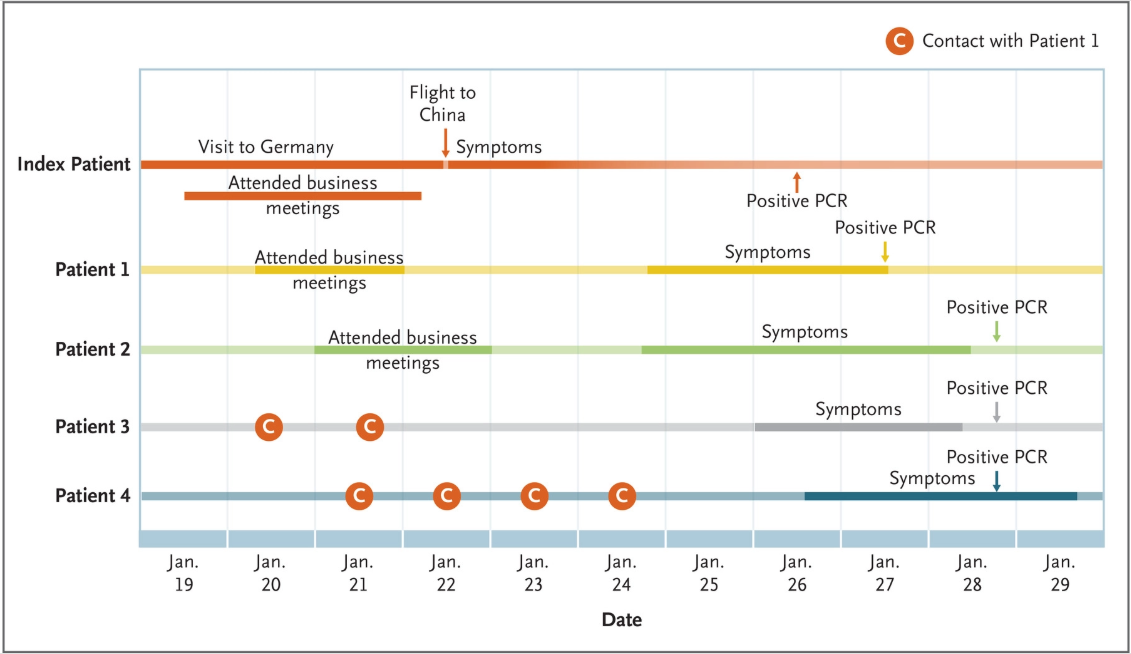New coronavirus can spread before symptoms start, German case suggests
A German man appears to have caught the virus at a business meeting with his colleague, who didn't show symptoms at the time.

Editor's note: On Feb. 3, officials in Germany said that the case report of coronavirus transmission before symptoms start is not entirely accurate. Contrary to the previous report, the colleague from China did have symptoms while visiting Germany, including muscle pain and a feeling of tiredness, according to Science Magazine. The colleague also took acetaminophen, which reduces fevers. The original report was based only on discussions with the coworkers in Germany, who said their colleague appeared not to have symptoms during her visit. Live Science published the original article below on Jan. 31.
The new coronavirus appears to be able to spread to another person even before an infected person shows symptoms, according to a new report of a case in Germany.
The report, published Jan. 30 in The New England Journal of Medicine, describes a 33-year-old, previously healthy man who developed a sore throat, chills and muscle aches on Jan. 24 and soon developed a fever.
The man had not traveled out of the country recently, but four days before he started showing symptoms, he had a business meeting with a colleague from China. Both the man and the colleague are employees of the German auto parts supplier Webasto, according to Reuters. At the time of the meeting, the colleague, a Shanghai resident, appeared well and had no signs of an infection. But during a flight back to China, the colleague became ill, and she tested positive for the new coronavirus, called 2019-nCov, on Jan. 26.
This prompted officials to track down all of the people the Shanghai resident had contact with during her business trip, including the 33-year-old German man. Tests conducted on Jan. 27 showed that the man was positive for 2019-nCov as well.
This report shows that "the infection appears to have been transmitted during the incubation period of the index patient [the Shanghai resident]," the authors wrote. (The incubation period is the time between when a person is infected with a pathogen and when they show symptoms.)
Related: Live updates on 2019-nCoV
Sign up for the Live Science daily newsletter now
Get the world’s most fascinating discoveries delivered straight to your inbox.
What's more, an investigation showed that three people in Germany who worked at the Webasto also tested positive for 2019-nCov. Of these three employees, only one had contact with the Shanghai resident during a meeting. This suggests that the German man infected at least two of his co-workers, also before he had notable symptoms.

All four of the German employees with 2019-nCov were hospitalized in Munich for monitoring. So far, none of these four patients show signs of severe illness.
"The fact that asymptomatic persons are potential sources of 2019-nCoV infection may warrant a reassessment of transmission dynamics of the current outbreak," the authors said.
Currently, there are 9,925 total cases of the new coronavirus, including 9,783 cases and 213 deaths in China, according to a live dashboard of the outbreak from Johns Hopkins University.
With most respiratory viruses, people are thought to be most contagious when they show the most symptoms — in other words, when they are the sickest, according to the U.S. Centers for Disease Control and Prevention. But that's not always the case — for example, people can spread the flu and the common cold about one to two days before they show symptoms. Diseases that spread before symptoms start can be harder to contain, according to STAT.
Still, the authors of the new report noted that "despite these concerns, all four patients who were seen in Munich have had mild cases and were hospitalized primarily for public health purposes." The authors called for more research into whether mild cases can be treated outside the hospital.
The news that the virus can spread before a person has symptoms puts a huge burden on screening efforts for the virus in the United States, Dr. Anthony Fauci, director of the U.S. National Institute of Allergy and Infectious Diseases, said during a White House news conference on Thursday. At the same conference, officials declared that U.S. citizens who have traveled to Hubei province in China (where the outbreak originated) will be subject to a 14-day mandatory quarantine upon returning to the U.S. In addition, Americans who have traveled to the rest of China will undergo screening at airports, and are asked to self-quarantine for 14 days. Foregin nationals who have traveled in China in the past 14 days will be denied entry into the U.S., officials said.
- The 9 deadliest viruses on Earth
- 27 devastating infectious diseases
- 11 surprising facts about the respiratory system
Originally published on Live Science.

Rachael is a Live Science contributor, and was a former channel editor and senior writer for Live Science between 2010 and 2022. She has a master's degree in journalism from New York University's Science, Health and Environmental Reporting Program. She also holds a B.S. in molecular biology and an M.S. in biology from the University of California, San Diego. Her work has appeared in Scienceline, The Washington Post and Scientific American.










